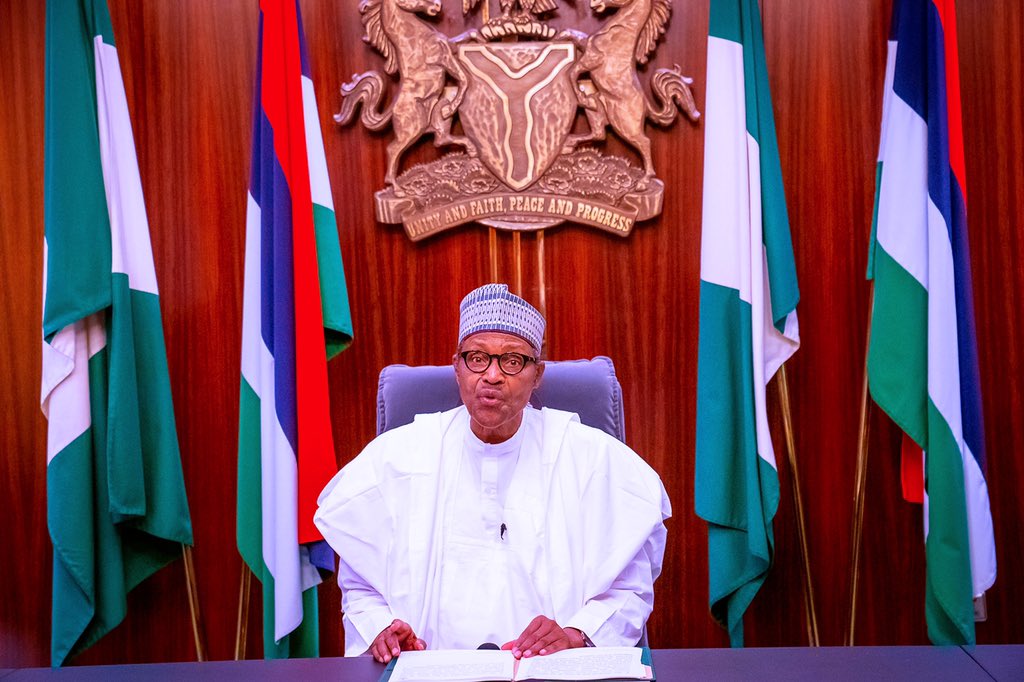COVID-19 Caused Recession – Buhari
 President Muhammadu Buhari has blamed the country’s current state of recession on the COVID-19 pandemic.
President Muhammadu Buhari has blamed the country’s current state of recession on the COVID-19 pandemic.
He said this on Monday in Abuja, while declaring open the 26th Nigerian Economic Summit with the theme: “Building Partnerships for Resilience”.
Over the weekend, Nigeria slid into its worst economic recession in over three decades. Gross domestic product (GDP) numbers released by the National Bureau of Statistics on Saturday, November 21, indicates the nation recorded a contraction of 3.62 percent in the third quarter of 2020, causing it to slide into another recession.
The summit was organised jointly by the Nigerian Economic Summit Group (NESG) and the Ministry of Finance, Budget and National Planning.
Read Also: Nigeria Will Exit Recession Soon – Minister Of Finance, Zainab Ahmed Says
Buhari, who was represented by Vice-President Yemi Osinbajo, said that the decline in the nation’s Gross Domestic Product (GDP) came after 12 successive quarters of positive growth.
He also added that the COVID-19 lockdowns, disruption in global supply chains, business failures and rising unemployment caused the recent recession.
The President said;
We can all recall that during the lockdown, farming did not take place, businesses were closed; schools were closed as were hotels and restaurants. Also, airlines stopped flying, while inter-state commerce was disrupted.
Buhari stated;
The economy only began to recover when these activities resumed and if we are able to sustain the nearly three percentage point increase from the second quarter decline of minus 6.1 per cent, the performance in the fourth quarter could take us into positive territory.
President Buhari disclosed his adminstration’s effort to mitigate such impact led to the introduction of Economic Sustainability Plan (ESP).
He further revealed that all the programmes in ESP are reliant on the private sector playing a key role in creating and conserving jobs and the production and delivery of services in agriculture, housing, solar power and digital technologies.
The President added;
Of course, an improvement in global economic conditions, including the restoration of global supply chains and resumption of exports and remittances, should enable a V-shaped recovery.
We expect, in the same spirit of partnership, that the private sector will complement these efforts by making maximum use of the provisions of the ESP and the Finance Bill when it is passed by the National Assembly and also by retaining and creating jobs so as to keep people at work.
In a similar spirit of partnership, private sector enterprises should also pay their due taxes.
Buhari also noted that partnerships are essential and also necessary for framing medium and long-term development plans as the nation combats the COVID-19 pandemic.
He pointed out that the private sector had a key role to play in the efforts to build a more resilient and competitive economy as expressed in the Economic Recovery and Growth Plan.
The President further averred that private companies in design, construction, logistics and finance were very much engaged in the nation’s infrastructural projects in power and rail as well as road and bridges.
He said;
I am pleased to inform in this regard that we are working actively with the CBN, the Nigerian Sovereign Investment Authority and state governments under the auspices of the National Economic Council to design and put in place a N15 billion Infraco Fund, which will be independently managed.
The Infraco Fund will help to close the national infrastructural gap and provide a firm basis for increasing national economic productivity and growth.

The loan approved by the world Bank will still be extorted by our leaders. The government don’t care about it’s citizens only their purse , what the use of getting the loan